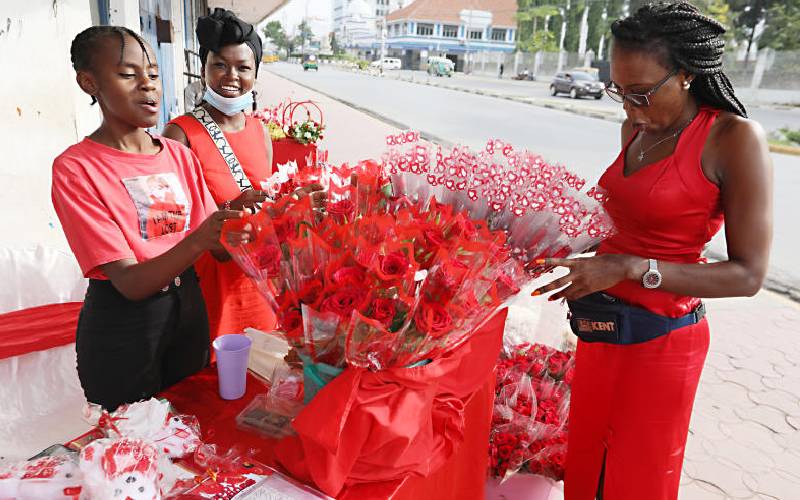
A customer, Judith Wilson buys valentine flowers at Fontanela in Mombasa. [Omondi Onyango,Standard]
Tomorrow will be Valentine’s Day; the day love will be in the air. It’s not clear where love is on other days. The city and most urban areas will be painted red if the economy allows.
Buying flowers and sponsoring candlelit dinners is not cheap amidst Covid-19.
Valentine is one of the many imports in addition to Christmas, Easter and more lately Halloween.
How did we celebrate love in our traditional societies? Did I hear some tribes or communities have no word for love?
Love is a strange phenomenon both for those who claim to have fallen in it and those who dream of falling in love. You can’t use words to express your feelings to someone else. It’s just a feeling, an emotion.
That does not stop us from saying “I love you,” you are my baby, my bae, my darling among other expressions of endearment. Just try translating these terms into your mother tongue when idle.
Beyond words, others are conspicuous about love, holding hands in public, kissing, hugging and traditional and non-traditional displays of love, whatever we think love is.
One elderly man told me that love is like a rainbow, beautiful but unreachable. Even those who have fallen in love are still seeking it.
Love is a great equaliser across races, social-economic class, colours and religious beliefs. While the affluent may have more opportunities to display love, it does mean they are in love more than the poor.
Curiously, love seems to cluster into social-economic classes, with the poor marrying the poor and the rich marrying the wealthy.
It’s not discrimination but we need to meet to fall in love, and the two classes meet in different places including schools, places of worship and workplaces. Where did you meet whoever, you fell in love with? It is said marriage is the golden route to Loveland. Can those married respond to that claim?
Love is hard to define because it’s a feeling, an emotion. That has not stopped industries based on love. Maybe the mystery behind love makes it an attractive industry.
We love mysteries like unsuccessfully seeking Genghis Khan’s tomb for 800 years. We haven’t found Dedan Kimathi’s too.
From media reports to music, books and movies, love is a popular theme. And a money-spinner.
Supply chains
Love is such a popular theme that it has been industrialised.
Think of all the flower farms and the supply chains from the farms to our living room or offices.
Few occasions are not complete without flowers - from weddings to funerals. We probably use more water and technology growing flowers than our staple food, maize.
Love follows us through life, from the time we are born to the time we die. There are flowers at weddings, the prelude to the start of a new life.
There are flowers when our pilgrim on this planet is over. We take flowers to the sick. It’s this cradle to the grave expression of love that makes it such an integral part of our lives. We kill for love, steal for love and live for love.
We should be blunter about love, it drives world economies. Flowers is just one of the love industries. Think of hotels and resorts themed in love and its cousin romance.
How many songs, movies, and plays are themed on love? Some even suggest love is a basic need and goods and services related to it should have a lower elasticity of demand, meaning their demand remains even when the economy is doing poorly- just like food.
The ultimate evidence that love drives the economy is babies, which should be born out of love.
Every baby, like flowers, should be a symbol of love.
The bitter truth could be different, some are symbols of love gone sour and betrayal or to be more specific, romantic conmanship.
I sympathise with unmarried parents, mostly women who bring up children alone when the fathers roam this planet like ghosts after a night of pleasure. They should pay for it. Pleasure and responsibility should always go together.
One Muslim friend asked a question that left my head spinning.
What is better, marrying four wives and taking care of them and their children or having 10 girlfriends you will never marry and whose children you may never take care of?
You can help me answer that question in the name of love.
The babies are consumers and create demand for goods and services. They do that throughout their lives. While we think population growth is a problem, that is what drives the markets for goods and services.
And supply labour. Why else do businesses prosper in the cities? Where else do countries worry if there is a population decline?
If you are in love, the whole country should celebrate. The dowry negotiators, the church, the schools, the ring makers, the event organisers, wedding gown designers, diaper manufacturers, schools and medics because children tend to be vulnerable to diseases before they develop immunity.
Which industry is insulated from love? Which industry is insulated from love? What’s the future of love, once Valentine day is over?
Like the coronavirus, love has been going through mutations.
Covid-19 reduced our interactions and the effects of that are yet to be documented. Did virtual love become a reality? What of an alternative lifestyle like cohabitation?
What of LBGTQ (lesbian, gay, bisexual, transgender, and questioning)?
What of pre-nuptial agreements and divorce? What of single parenthood? What of prostitution?
Have all these changes redefined love? Have we commercialised love into lovelessness? How will our grandchildren fall in love?
What are your plans for Valentine’s Day tomorrow? Will you buy flowers, have a candlelit dinner? Or will you watch from a distance as Kenyans display their love or lack of it?
Talk to us…
 The Standard Group Plc is a multi-media organization with investments in media platforms spanning newspaper print
operations, television, radio broadcasting, digital and online services. The Standard Group is recognized as a
leading multi-media house in Kenya with a key influence in matters of national and international interest.
The Standard Group Plc is a multi-media organization with investments in media platforms spanning newspaper print
operations, television, radio broadcasting, digital and online services. The Standard Group is recognized as a
leading multi-media house in Kenya with a key influence in matters of national and international interest.











